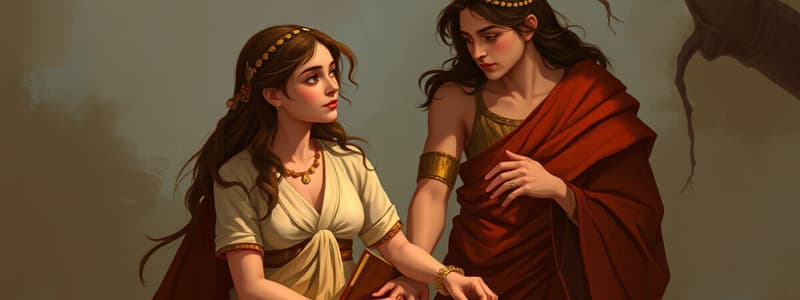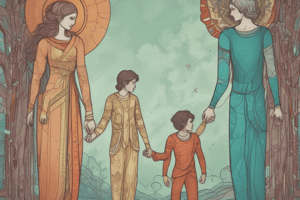Podcast
Questions and Answers
What does Mother give to Horatia?
What does Mother give to Horatia?
- Tablets
- A tunic (correct)
- Flowers
- A dog
What does Quintus give to the girls?
What does Quintus give to the girls?
Flowers
The Trojans reach an unknown land after a storm.
The Trojans reach an unknown land after a storm.
True (A)
Who tells Aeneas to flee from Troy?
Who tells Aeneas to flee from Troy?
What does Aeneas see when he climbs the hill?
What does Aeneas see when he climbs the hill?
Dido welcomes Aeneas and the Trojans to her ______.
Dido welcomes Aeneas and the Trojans to her ______.
What does Aeneas carry on his shoulders?
What does Aeneas carry on his shoulders?
What does Dido ask Aeneas to tell her about?
What does Dido ask Aeneas to tell her about?
What do the Trojans do when the Greeks leave?
What do the Trojans do when the Greeks leave?
The Greeks cannot take Troy after ______ years.
The Greeks cannot take Troy after ______ years.
Who comes up with the idea for the wooden horse?
Who comes up with the idea for the wooden horse?
What does the friend say about the dog?
What does the friend say about the dog?
Study Notes
Cartoon Captions
- Mother gifts a new tunic to Horatia, showcasing familial bonds.
- Father presents Quintus with a dog, emphasizing the nurturing aspect of parenthood.
- Master distributes tablets to the children, highlighting the importance of education.
- Children share their tablets with parents, reflecting communication within families.
- Quintus offers flowers to the girls as a gesture of friendship or affection.
- The girls return the flowers to Quintus, potentially illustrating modesty or a social custom.
Meeting of Dido and Aeneas
- Aeneas and the Trojans encounter a storm while sailing from Sicily, causing dire circumstances.
- Aeolus, king of the winds, unleashes all winds, endangering the Trojans' journey.
- Eventually blown to an unknown land, they rest upon reaching the shore.
- Aeneas decides to explore, instructing his comrades to stay near the ships.
- He climbs a hill, sees men constructing a city, and expresses envy over their settled existence.
- Upon entering the city, Aeneas is awestruck by the temple's murals depicting the Trojan War.
- He identifies figures like Priam, Achilles, and Agamemnon within the artwork.
- Queen Dido approaches, expressing her understanding of the Trojans' plight and offering help.
- Dido welcomes Aeneas and the Trojans, leading them to a feast where Aeneas shares tales of Troy's fall.
Aeneas Tells of the Fall of Troy
- Ten years of Greek siege leads to Trojan resilience, but the Greeks ultimately depart.
- Joy turns to despair as Trojans rush to the Greeks' deserted camp, discovering a massive wooden horse.
- Aenesan's dream of Hector urges him to flee the city, providing sacred emblems for guidance.
- Awakening to the destruction, Aeneas arms himself and calls on comrades to fight, but they cannot resist.
- Aeneas recalls his family's safety, returning home to evacuate them amidst flames.
- He leads his father and son to safety, contrasting the horror of war with paternal duty.
- His search for his wife proves fruitless, leading him to regroup with fellow survivors.
- The next day, Aeneas’s group finds ships and sails away for new lands.
Exercise 11.1
- Multiple noun phrases are presented, reflecting cases in Latin:
- "bonae puellae" (good girls)
- "fīliō cārō" (dear son)
- "regī fortī" (brave king)
- "mātribus laetīs" (happy mothers)
- "omnibus lītoribus" (to all the shores)
- "parvō puerō" (small boy)
Exercise 11.2
- A series of directional or imperative phrases demonstrating Latin structure:
- Request for dinner: "Give me dinner."
- Showcasing ownership: "I show you my father's horse."
- Narrating actions in context: "Tell us a happy story."
- Subsequent dialogues highlight exchanges of gifts.
Exercise 11.3
- Short sentences depict actions relating to giving and teaching:
- "fēmina aquam equīs dat." (The woman gives water to the horses.)
- "pater fīliō cibum dat." (The father gives food to the son.)
- "puer cibum patri reddit." (The boy returns food to the father.)
Exercise 11.4
- Statements detailing events that connect to the Greek siege of Troy:
- Trojans' brave resistance; Greeks unable to breach the city.
- Odysseus devising a cunning plan involving a wooden horse.
- Agamemnon endorsing Odysseus' strategy for capturing Troy.
- Illustrations of children's diligence contrasted with Quintus' domestic interactions.
Exercise 11.5
- Narratives of everyday encounters reflecting routine life:
- Horatia meeting her mother in the street, requesting assistance.
- Family dynamics as Quintus meets his family upon returning home.
- Dido hosting a grand dinner for the Trojan princes, signifying hospitality.
- Aeneas recounting the laborious experiences of the Trojans after dinner.
Studying That Suits You
Use AI to generate personalized quizzes and flashcards to suit your learning preferences.
Description
This quiz explores the themes of familial bonds and the adventures of Aeneas in literature. Delve into the significance of relationships portrayed in cartoon captions alongside the epic journey of Dido and Aeneas through storms and encounters. Test your understanding of these narratives and their underlying messages.




